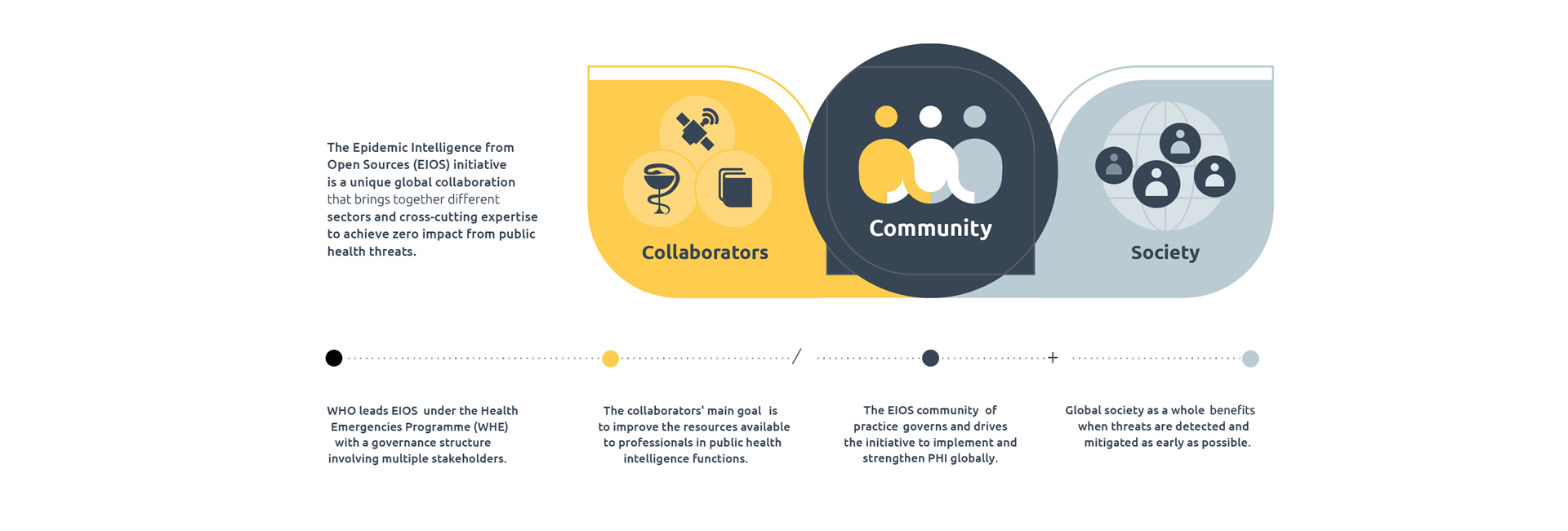
Leadership and Governance
A joint commitment
Formalised at the end of 2017 under the leadership of WHO’s Health Emergencies Programme (WHE), the EIOS initiative is the culmination of a joint commitment by the Global Health Security Initiative (GHSI), the Joint Research Centre of the European Commission (JRC) and WHO to enhance capacity to assess epidemic threats to global health security (refer to the Ministerial Statements of the Seventeenth Ministerial Meeting of the Global Health Security Initiative, 24 February 2017 – Brussels, Belgium). The EIOS Core Team (ECT) was subsequently set up within WHE to lead EIOS and is tasked with further developing and expanding the initiative and its related aspects, including its community, technology and governance.
Since January 2022, the ECT is hosted within the Intelligence Innovation and Integration (III) unit of the new WHO Hub for Pandemic and Epidemic
Intelligence, a sepcialized department of the WHE.
The Hub in Berlin is responsible for building a system of
collaborative intelligence enabling better decisions to avert and manage public
health threats and risks. Its goal is to enable, strengthen and support
countries, regional and global actors in averting and managing public health
threats and risks through collaborative problem solving and decision-making for
short-term action and long-term policies, informed by better data and analytics. EIOS is one of the new Hub’s
flagship initiatives and one of its main vehicles for building a strong Public Health Intelligence (PHI) community of practice, as well as a
multidisciplinary network to support it, as a part of its mission.
As
a global collaboration, the EIOS initiative is governed by a 15-member
Coordination Group (CG) with representatives from various organisations. The CG
meets quarterly to discuss and advise on developments and priorities for the
initiative and system.
While
the ECT is a small team located at the WHO Hub in Berlin, Germany, it is supported by a
team of professionals at all six WHO regional offices. Together with EIOS focal
points at collaborating organisations and networks, they
form the wider Global EIOS Support Team (GEST), making EIOS
a truly global collaboration led by WHO.

The EIOS Core Team
Unit Head, Intelligence Innovation and Integration
Training Officer
Medical Officer
Frank Kagoro
Sources Coordinator
Julie Fontaine
Epidemiology Coordinator
Engagement Coordinator
Support
Hamed Mir Alam
Administrative Assistant
Jason Seva
Project Manager
The EIOS regional team
Christian Hertlein
EIOS Focal Point, PAHO
Freddy Kambale
EIOS Focal Point, AFRO (West Africa)
George Sie Williams
EIOS Focal Point, AFRO
Hemant Kumar Jha
Sources Coordinator, SEARO
Joyce Nguna
EIOS Focal Point, AFRO (Southern Africa)
Kareena Hundal
EIOS Focal Point, EURO
Kátia Uchimura
EIOS Focal Point, PAHO
EIOS Focal Point, PAHO
Mahmoud Sadek
EIOS Focal Point, EMRO
Pavana Murthy
EIOS Focal Point, SEARO
Ramazani Mangosa Zaza
EIOS Focal Point, AFRO (East and Central Africa)
Raúl Garcia
EIOS Focal Point, PAHO
Stefany Ildefonso
EIOS Focal Point, SEARO
Viema Biaukula
EIOS Focal Point, WPRO
The EIOS Coordination Group
.jpeg?sfvrsn=7251e2fa_9)
Former EIOS team members
All →Carolyn Briody
Expansion Consultant
Heidi Ghanem
Training/Tech Consultant
Yeon Kyeng Lee
Secondee KDCA
Tamar Amar
EIOS Focal Point, EURO
Philippe Barboza
Former Project Authority
Ingrid Nezu
Training/Tech Consultant
Farah Kader
Categories Coordinator
Tamanna Patel
Business Analyst
Lucia Hernandez Garcia
EIOS Focal Point, EURO
Emilie Peron
Former Evaluation Coordinator (EIOS Core Team)
Olga Lugovska
Engagement Consultant
Mostafa Mahran
Technology Consultant
Sarah Abdulhady
EIOS Focal Point, EURO
Team Lead, Alert and Verification
